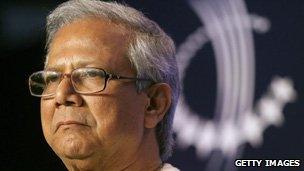Grameen founder Muhammad Yunus in Bangladesh aid probe
- Published

Grameen Bank's micro-finance model has been replicated around the world
Norway says it is examining reports that Nobel Peace Laureate Muhammad Yunus allegedly diverted millions of dollars of aid money from a bank.
International Development Minister Erik Solheim said that it was "totally unacceptable that aid is used for other purposes than intended".
A documentary maker has alleged that cash was diverted from Professor Yunus' Grameen Bank to other parts of Grameen.
In a statement, the bank said that the allegations were false.
It said that a full explanation with more details would be provided at the "earliest convenient time".
The bank was set up by Professor Yunus to provide micro-credit - or small loans - to the poor.
The move by the Norwegians - who insist that no criminal activity has taken place - comes at a time when the reputation of the micro-credit industry has been under attack.
The original aim of the micro-credit concept was poverty reduction, but in recent years some micro-financial institutions have been criticised over exorbitant interest rates and alleged coercive debt collection.
In the south-eastern Indian state of Andhra Pradesh, for example, micro-loans have been blamed for a series of suicides among struggling farmers.
It is estimated some 250 organisations in the state have handed out loans totalling more than £1.65bn (£883m), only a small proportion of which have been paid back.
Objections
The Grameen Bank's denial followed the release of a documentary by Danish filmmaker, Tom Heinemann, who claimed Professor Yunus and his associates diverted nearly $100m of grant money to another company - Grameen Kalyan - which was not involved in micro-credit operations.
Mr Heinemann said he stumbled upon the documents and letters relating to the alleged transfer while doing research for his documentary on micro-credit.
"I got most of the documents from the archives of Norad, the Norwegian aid agency in Oslo," he said.
The Grameen group of more than 30 companies headed by Professor Yunus is divided between those not operating for profit and those which do.
Mr Heinemann's report alleged that after the Norwegian authorities raised objections to the alleged transfer of funds, the Grameen bank returned about $30m. The aid money was from Norway, Sweden and Germany.
Professor Yunus, known as the Banker to the Poor, and the Grameen Bank were awarded the Nobel Peace Prize in 2006 "for their efforts to create economic and social development from below".
Replicated model
The economist founded the bank, which is one of numerous organisations now providing loans to the poor - especially women - in Bangladesh.
The micro-credit lending model has been replicated in other parts of the world.
Reacting to the latest report, the Norwegian authorities say they have no suspicions of tax fraud or corruption committed by Grameen Bank.
"Having said that, the Government of Norway finds it totally unacceptable that aid is used for other purposes than intended no matter how praiseworthy the causes might be," Norwegian International Development Minister Erik Solheim said in a statement e-mailed to the BBC.
Mr Solheim said that he had asked the Norwegian Agency for Development Co-operation for a full report on the matter.
"At the same time it is important to stress that we are firm believers in micro-finance as a tool in the fight against poverty," he said.
The documentary "Caught in Micro Debt" was shown on Norwegian National Television earlier this week.
"I travelled to Bangladesh, India and Mexico to find out whether micro-credit loans have really helped the poor. But I found out that poor people are getting into more and more debt because of micro-credit loans," Mr Heinemann told the BBC.
He said that he was not accusing Professor Yunus of misusing the money or personally benefiting from the transfer.
- Published2 March 2011
- Published3 November 2010
- Published27 July 2010